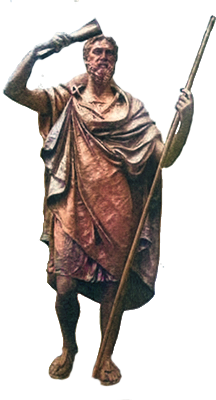
Persian King Xerxes I and the Greek historian Herodotus are the main protagonists of this story. Herodotus was born during the reign of Xerxes' father, Darius I, circa 490 BC, in Halicarnassus a port city in southwestern Caria, Asia Minor (modern Bodrum, Turkey); he traveled widely and attained celebrity in Pericle's Athens. After a productive life, Herodotus joined a migratory group bound for Magna Graecia to start a new Greek colony, the city of Thurii (in modern Calabria, Italy), where he settled and likely died some time before 425 BC.
Much has been written about Herodotus and his work in multiple books and papers. I have not found one yet that failed to contribute to the appreciation of this historical figure of the highest profile. Among them, however, John Gould's little book, Herodotus (1989) uniquely captures the essence of the idea and the man. I defer to Gould's prose, therefore, to best inform the reader about Herodotus' achievements and his main source of material: oral tradition.
It is important that we should remind ourselves of the extent to which the vast majority of these oral traditions are of purely local currency, because otherwise we shall not come near to taking the measure of Herodotus' originality, nor understand the truly daunting nature of the task he set himself. It is an essential part of the function of 'social memory' on which Herodotus draws that it should serve to maintain the solidarity of the local community and the distinctive nature of its experience. We must bear in mind how small the typical community of fifth-century Greece typically is. How narrow the distance separating one community from the next and how strong the sense of difference and enmity between neighbors which supported the community's sense of identity and distinctiveness. A community's traditions will often have had no value outside its own borders and will often have encountered a contrary tradition in the very next community: the polis next door was another world. Thus the Greek world will have contained a myriad of separate and different 'social memories' enshrined in oral tradition. Even if it was part of 'Xerxes' legacy,' to have created, for a time, a new and powerful sense of common Greekness among the Greek communities, that does not lessen Herodotus' achievement, which was to have caught the sense of that common Greekness and turned local memory into universal narrative. (Gould, 1989, p. 38)
By using the word 'historie' to discribe his work, Herodotus establishes the current meaning of the word and aligns himself with a tradition of positivist thinking and rational analysis, which had been created in Ionia over the past century. Euripides uses historie to refer to intellectual enquiry of all kinds. (Gould, 1989, p. 11)
Archaeologists also made important discoveries. While the Achaemenid period was difficult to identify at many sites, the excavations at Sardis, Deve Hüyük, Pasargadae, and Persepolis revealed many remains of weapons. Sardis was one of only several fortified sites where destruction layers seem to correspond to campaigns described by Herodotus. Unlike other writers, Herodotus shows no systematic hostility towards Persians and foreigners.

